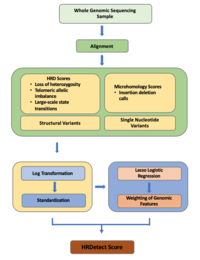
Photo from wikipedia
Simple Summary This review article is a summary of the current state of knowledge regarding the genetics of pancreatic cancer and a presentation of possible treatment options reflecting genomic medicine… Click to show full abstract
Simple Summary This review article is a summary of the current state of knowledge regarding the genetics of pancreatic cancer and a presentation of possible treatment options reflecting genomic medicine advances and a personalised medicine approach. Several oncogenes in which somatic changes lead to the development of tumours, including genes BRCA1/2 and PALB2, TP53, CDKN2A, SMAD4, MLL3, TGFBR2, ARID1A and SF3B1, are involved in pancreatic cancer. Between 4% and 10% of individuals with pancreatic cancer will have a mutation in one of these genes. Six percent of patients with pancreatic cancer have NTRK pathogenic fusion. It is estimated that from 24% to as many as 44% of pancreatic cancers show homologous recombination deficiency (HRD). The most common cause of HRD are inactivating mutations in the genes regulating this DNA repair system, mainly BRCA1 and BRCA2, but also PALB2, RAD51C and several dozen others. Abstract The number of cases of pancreatic cancers in 2019 in Poland was 3852 (approx. 2% of all cancers). The course of the disease is very fast, and the average survival time from the diagnosis is 6 months. Only <2% of patients live for 5 years from the diagnosis, 8% live for 2 years, and almost half live for only about 3 months. A family predisposition to pancreatic cancer occurs in about 10% of cases. Several oncogenes in which somatic changes lead to the development of tumours, including genes BRCA1/2 and PALB2, TP53, CDKN2A, SMAD4, MLL3, TGFBR2, ARID1A and SF3B1, are involved in pancreatic cancer. Between 4% and 10% of individuals with pancreatic cancer will have a mutation in one of these genes. Six percent of patients with pancreatic cancer have NTRK pathogenic fusion. The pathogenesis of pancreatic cancer can in many cases be characterised by homologous recombination deficiency (HRD)—cell inability to effectively repair DNA. It is estimated that from 24% to as many as 44% of pancreatic cancers show HRD. The most common cause of HRD are inactivating mutations in the genes regulating this DNA repair system, mainly BRCA1 and BRCA2, but also PALB2, RAD51C and several dozen others.
Journal Title: Cancers
Year Published: 2023
Link to full text (if available)
Share on Social Media: Sign Up to like & get
recommendations!